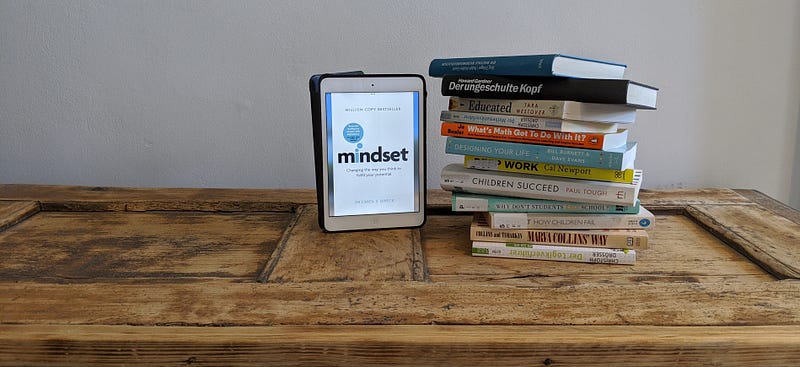“The skill I was learning was a crucial one, the patience to read things I could not yet understand.” — Tara Westover

In early 2018, I started asking every educator I met for book recommendations. It’s one of the habits that has changed my mind. Since March 2018, I’ve read 116 books.
This list portraits my eight favorite education books. For each book, I included my favorite quote, a one-sentence summary, three key lessons, and reasons why you might be interested in reading each book.
Table of Contents
Inspiring Stories
1. Educated by Tara Westover
2. I Am Malala by Malala Yousafzai
Rethinking Education
3. Prepared: What Kids need for a fulfilled Life by Diane Tavenner
4. Creative Schools by Ken Robinson and Lou Aronica
5. Mindset by Carol Dweck
6. How Children Succeed by Paul Tough
For Educators
7. Teach Like a Champion by Doug Lemov
8. Mathematical Mindsets by Joe Boaler
1. Educated by Tara Westover
“The skill I was learning was a crucial one, the patience to read things I could not yet understand.”
— Tara Westover
The Book in One Sentence
An unforgettable memoir about a woman who was seventeen the first time she set foot in a classroom and, despite her extremely difficult family circumstances, managed to earn a Ph.D. from an elite university.
Key Takeaways
- Education can be a way out of the most difficult situations
- Whatever learning challenge you face, you can do it
- Life is a quest for learning; one is never done with it.
Why should you read it?
This book is not only beautifully written, but it’s also one of the most powerful success stories about higher education. You’ll peek inside a Mormon family and off-grit Idaho life. Tara’s story will motivate and stick with you long after reading.
2. I am Mala by Malala Yousafzai
“One child, one teacher, one book, one pen can change the world.”
― Malala Yousafzai
The Book in One Sentence
I Am Malala celebrates the importance of girl’s education and portraits of brave parents who fight for their daughter’s rights in a society that favors men.
Key Takeaways
- The more you learn, the more you recognize the value of learning
- Education empowers people to have confidence in themselves
- All of us should stand up for the importance of education
Why should you read it?
This is one of the books that might end up changing the way you think and feel. Malala will put your life into perspective and will make you feel grateful for the rights you already have. Moreover, you’ll feel the importance of global (women) education from the first to the last scene.
3. Prepared: What Kids Need for a Fulfilled Life by Diane Tavenner
“Mastery is when you become good at something, autonomy is when you have some measure of control, and purpose is when you’re doing something for a reason that is authentic to you.”
— Diane Tavenner
The Book in One Sentence
This book is Diane’s story about designing innovative charter schools, so-called Summit schools, that focus on the ambitious goal to teach kids what they need to live a good life.
Key Takeaways
- Summit schools build on the three key elements: Self-directed learning, project-based learning and mentoring
- Summit schools make use of technology to enable personalized-learning experiences
- Besides reading, writing, and maths, the school teaches skills like self-confidence, the ability to learn, ability to manage their time, and a sense of direction
Why should you read it?
Diane dares to rethink our current education model by asking questions like “What is best for our kids?” and “What should I be doing now for my kids?”. Exploring these questions, she draws on stories of her troubled childhood. With hands-on advice, this story has the power to inspire teachers, parents, and decision-makers.
4. Creative Schools by Ken Robinson and Lou Aronica
“Education thrives on partnership and collaboration — within schools, between schools, and with other groups and organizations.”
— Ken Robinson
The Book in One Sentence
A guide for transforming education so that kids receive state-of-the-art training and develop the skills they need to excel in our transforming world.
Key Takeaways
- Several elements of our education system are based in the industrial period, like batching children by age group, fixed teaching periods, sharp subject divisions, and linear assessment methods
- Creative schools cultivate curiosity, creativity, criticism, communication, collaboration, compassion, composure, and citizenship.
- In a new environment, expert teachers fulfill four roles: engage, enable, expect, and empower.
Why should you read it?
This book highlights not only current flaws in our education systems but also provides concrete solutions, like child-centered learning and real-world curricula. After reading, you’ll know what parents, teachers, administrators, and policy-makers can do to change our outdated system.

5. Mindset: The New Psychology of Success by Carol S. Dweck
“No matter what your ability is, effort is what ignites that ability and turns it into accomplishment.”
― Carol S. Dweck
The Book in One Sentence
By distinguishing between a fixed and a growth mindset, the author demonstrates how success in school, work, sports, the arts, and almost every area of human endeavor is influenced by how we think about our talents and abilities.
Key Takeaways
- Mindsets shape whether we believe we can or can’t learn, change and grow
- People with a fixed mindset seek approval while those with a growth mindset seek development
- Role models from our childhood strongly influence our attitudes and ideas, yet we can change our mindset even in adulthood
Why should you read it?
This book is a must-read for every person looking for growth. After reading this book, you’ll be able to integrate a growth mindset into your life. For example, you’ll see mistakes as valuable learning opportunities. Studying this book can empower any educator to make positive changes in the classroom environment.
6. How Children Succeed by Paul Tough
““What matters, instead (of cognitive intelligence), is whether we are able to help her develop a very different set of qualities, a list that includes persistence, self-control, curiosity, conscientiousness, grit, and self-confidence. Economists refer to these as noncognitive skills, psychologists call them personality traits, and the rest of us sometimes think of them as character.”
― Paul Tough
The Book in One Sentence
Based on scientific studies and data from existing schools, this book explores factors that affect the success of children and proposes a new way of thinking about how children learn.
Key Takeaways
- “Executive Function” is a set of cognitive processes that drive and develop persistence, self-control, curiosity, motivation, determination, and confidence
- Executive Function Matters More To Academic Achievement as it begets character and character begets success
- Stress, in the form of a traumatic childhood experience, has a bigger impact on education than poverty
Why should you read it?
How children succeed has been described as “essential reading for anyone who cares about childhood in America.” It’s not only great for educators, but also parents as it explores traits like perseverance, conscientiousness, and self-discipline as ways to succeed in life. After reading this book, you’ll critically question the “intelligence theory” and understand why some people struggle in school and later in life while others thrive and prosper.
7. Teach Like a Champion by Doug Lemov
“Teach students how to do things right, don’t just establish consequences for doing them wrong.”
― Doug Lemov
The Book in One Sentence
A hands-on description of actual techniques and tools teachers can use for classroom management and attention encouragement.
Key Takeaways
- Effective educators have a large variety of techniques at their disposal
- Structure and deliver lessons with hooks, check for understandings, exit tickets, and reflection
- Create strong classroom cultures with entry routines, do now’s and non-verbal signaling
Why should you read it?
While this book is rather classic in terms of endorsing teaching to the test, the techniques work. In my first year of teaching, many tools helped me creating a constructive learning environment and designing engaging lessons. Doug Lemov gives countless useful, concrete tips for beginning teachers in elementary and middle-school classes. If you want to get a glimpse of the content, take a look at this well-structured summary.
8. Mathematical Mindsets: Unleashing Student’s Potential Through Creative Math, Inspiring Messages and Innovative Teaching by Jo Boaler
““Mathematics is at the center of thinking about how to spend the day, how many events and jobs can fit into the day, what size of space can be used to fit equipment or turn a car around, how likely events are to happen, knowing how tweets are amplified and how many people they reach.”
― Jo Boaler
The Book in One Sentence
Mathematical Mindsets puts Dweck’s mindset research into practice by offering strategies and activities that show every child can enjoy and succeed in math.
Key Takeaways
- Quality questions, described as low floor — heigh ceiling activities, are a simple and effective tool for self-differentiation
- Encourage students to make and learn from mistakes, as errors are a necessary precondition for learning.
- Focus on progress instead of performance, place effort before talent.
Why should you read it?
This book is great for pre-service teachers, as well as experienced educators who want to encourage their student’s growth mindsets. I read many book books on teaching maths, but this actionable advice has affected my teaching in the most profound way. Jo Boaler offers more practical information than Dweck’s “mindest” and is explicitly focused on teaching and learning.
Do you want to stay in touch? Join my E-Mail List.